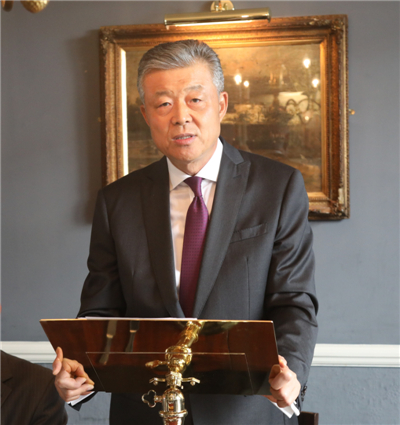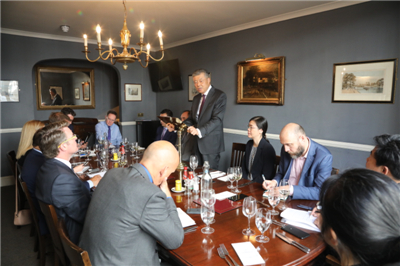|

Friends from the Press:
Good afternoon!
It is a real delight to join you and talk about China’s foreign and defence policies and other issues of interests.
The world is undergoing profound changes unseen in a century. Peace and development remain the theme of our times. But as instabilities and uncertainties are on the rise, the world is far from a tranquil place. With surging hegemonism, unilateralism and populism, incessant regional conflicts and wars, and spreading extremism and terrorism, the international security system and order are under threat.
As President Xi Jinping said, the international community is faced with the severe challenge of “peace deficit”. How to bridge the “peace deficit”? Today, I would like to share with you my views on what China and the world can do.
First, what can China do to bridge the “peace deficit”? The answer lies in China’s path, concept and mission.
First, China takes the path of peaceful development.
China is a socialist country with a peace-loving tradition and an independent foreign policy. The path of peaceful development is a natural choice for China. China has made this strategic choice in accordance with the trend of the times and China’s fundamental national interests. We are committed to this path. It is true that China is developing and becoming stronger, but we will never seek hegemony, expansion or sphere of influence.
China will deepen friendly relations with all countries under the Five Principles of Peaceful Coexistence. At the same time, China hopes that other countries would also follow the path of peaceful development and work with China to build enduring peace and sustainable stability in the world.
China’s defence policy is defensive in nature. In the past 70 years since the founding of New China, China has never started a single war or conflict. It has even cut down military personnel by 4 million over the past 40 years.
China maintains limited nuclear power only for the purpose of self-defence and deterrence. China is the only nuclear power in the world to have promised no first use of nuclear weapons.
Of the five permanent members of the UN Security Council, China has the lowest level of military expenditure both as percentage of GDP and in per capita terms. In 2019, it is only one fourth of that of the US. In recent decade, China’s military expenditure had been around the level of 1.32% of GDP, far below the 2.4% world average. In per capita terms, China’s military spending was only one eighteenth of the US and one ninth of the UK.
Second, China follows the New Security Concept.
In face of the new situation and new challenges in the field of international security, China believes that the confrontational approach inherited from the Cold-War era is not a solution; In this new era, countries should follow a new concept of common, comprehensive, cooperative and sustainable security; Cooperation is the way to peace and security.
In this spirit,
-
China initiated the Shanghai Cooperation Organisation with the other countries in the region. The member states of SCO advocate the Shanghai spirit, which features mutual trust, mutual benefit, equality, consultation, respect for diverse civilisations and pursuit of common development.
-
China took an active part in the Conference on Interaction and Confidence-Building Measures in Asia, and played an import role in setting up this framework for security cooperation in Asia.
-
China has also actively promoted global security governance. It is deepening bilateral and multilateral cooperation on security, aiming at building a new type of security partnership featuring equality, mutual trust and win-win cooperation.
Third, China has taken up the mission of safeguarding world peace.
As a permanent member of the UN Security Council, China has been a staunch force safeguarding world peace.
-
China is the second largest contributor to the UN peacekeeping budget and the largest contributor of peacekeeping personnel among the P5.
-
By the end of 2018, China has sent more than 39,000 military personnel to 24 UN peacekeeping missions, and 13 brave Chinese soldiers gave their life for this lofty cause.
-
In the Gulf of Aden and off the Coast of Somalia, Chinese navy carries out regular escort missions, having ensured the safe passage of more than 6,600 ships, including those from the UK.
-
From the Korean Peninsula nuclear issue to the Iran nuclear issue, from Myanmar to Afghanistan, China has taken part in the settlement of almost all international and regional hotspot issues.
-
China has provided humanitarian relief and aid to places such as West Africa during the Ebola epidemic. It has also engaged in international and regional counter-terrorism cooperation.
In a word, China is always a contributor to world peace.
Now let me turn to the second part of my speech: what can the world do to bridge the “peace deficit”?
In the 21st century, security issues are becoming increasingly inter-connected, cross-border and diverse. To ensure world peace, the international community must pull together in the same direction and come to each other’s aid in times of difficulty. It is our hope that all countries in the world remain committed to the following three principles and oppose three wrong ideas.
First, countries should remain committed to win-win cooperation and oppose zero-sum game.
We are living in an age of globalization. Countries are interdependent and form a community with a shared future for mankind. No country is immune from problems or is able to address all the challenges alone. Working together is the only way forward.
In this day and age, the old mindset of “zero-sum game” or “winner takes all” does not work. Seeking to maximise one’s own interests or putting one’s own country first at the expense of others will lead to more conflicts and confrontations. Countries should engage in inclusive, balanced and win-win cooperation. This is the new concept that countries should follow. It is the only way to make sure that the benefit of economic globalisation is shared. It is also the only way to eradicate the breeding ground for chaos and turbulences.
The global industrial chain and network is the result of years of work by many countries. Turning it into a weapon and provoking a tariff war, a trade war, or even a financial war and a hi-tech war will not only do harm to others. This will also backfire.
Second, countries should remain committed to equal-footed consultation and oppose acts of bullying.
The world has maintained overall peace for more than 70 years since the end of the Second World War. This could not have been possible without the international-law-based system with the UN as its core, and the rule-based multilateral trade system with the WTO as its core.
The current international order may not be perfect. But one cannot scrap it, start all over again or cherry-pick what one wants.
International issues should be addressed through consultation that involves all the parties concerned. This principle applies to economic and trade relations. Whenever differences and problems arise, the parties should carry out equal-footed dialogue and consultation in the spirit of mutual respect. They should not resort to protectionism or unilateralism at will.
Third, countries should remain committed to exchanges and mutual learning, and oppose such actions as lording it over others.
I have been a diplomat for more than 40 years. I have worked in Africa, North America, Asia and Europe. All these years, I have been deeply impressed by the rich variety of cultures and civilisations of different countries.
Recently, out of narrow-mindedness and exclusive-club mentality, some in the West tried to resurrect the theory of “conflict of civilisations”. This is a completely outdated concept.
Human civilisations are diverse. No civilisation is superior to another.
The Belt and Road Initiative that China proposed carries on the Silk Road spirit of peace, cooperation, openness, inclusiveness, mutual learning and mutual benefit. It is an important platform for exchanges and cooperation between all countries in the world.
China hopes that the countries of the world would respect the diversity of different civilisations, promote exchanges, mutual learning and harmonious co-existence, and appreciate each other for their unique beauty.
Peace is like air and sunshine. Its presence is easily taken for granted but its absence is life-threatening. Whenever countries come to a crossroads and have to choose, they should choose peace not war, choose development not stagnation, choose dialogue not confrontation, choose to embrace not to exclude.
It is in the common interests of both China and the UK to safeguard world peace and stability. It is in our common interests to uphold multilateralism and free trade. Our two countries have a sound basis for cooperation on regional and global issues, such as the Iran nuclear issue and climate change.
Going forward, China stands ready to work with the UK and other countries in the world to shoulder due responsibilities, to bridge the “peace deficit”, and to make greater contribution to world peace and common development.
Thank you!

|

